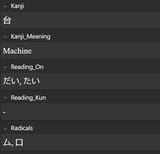>>214373424
I assume you're talking about WK users? They would stumble upon a word they hadn't seen before, and try to construct the meaning using keywords they had learned from WK.
This is probably not a good example, but let's assume you have never seen the word 学生 before. Trying to figure out what the word means using WK keywords alone would give you "study, life". And then it's easy to make the connection to student if it is told to you. "Ah, a student's entire life is study", you'd think, and then you'd never forget it because it's one of the easier words out there.
But if you're not sure and all you have is the keywords, then you may end up translating it as "curriculum" or "school life" in the moment, and then the meaning of the text you're reading would change drastically and you'd end up spending a lot of time trying to debug the part that went wrong in your reasoning when stuff eventually doesn't add up.
Then there's stuff with weird keywording.
I just looked through the wanikani anki deck posted here:
>>214372264
And there's stuff like the picture I posted, where 台's keyword (or meaning, as written here) is "machine", and that's supposed to help you remember the mnemonic and other subsequent ones based on their system. The problem is that 台 in actual use has more to do with platforms (more generically, flat surfaces you put stuff on). The kanji 台 if you look it up in a Japanese dictionary would come up with the definition of "platform" earlier than "counter for machines", which is how it is used here. Words like 土台 or 台車 come to mind.
The other problem in this case, is that there is another kanji that means "machine", which is 機. According to that anki deck, 機's keyword is also "machine", which makes things confusing. How are these two machines different? Unless WK has something that lets you know "hey, these two have the same keyword but actually they're different, here's how:", then imo you're getting ripped off.
